Add spaces to Beginning, End or between chars in Python
Last updated: Apr 8, 2024
Reading time·7 min

# Table of Contents
- Add spaces to the end of a String in Python
- Add spaces to the beginning of a String in Python
- Add space between variables in Python
- Add spaces between the characters of a string in Python
# Add spaces to the end of a String in Python
Use the str.ljust() method to add spaces to the end of a string, e.g.
result = my_str.ljust(6, ' ').
The ljust method takes the total width of the string and a fill character
and pads the end of the string to the specified width with the provided fill
character.
my_str = 'abc' result_1 = my_str.ljust(6, ' ') print(repr(result_1)) # 👉️ 'abc ' result_2 = my_str + " " * 3 print(repr(result_2)) # 👉️ 'abc ' result_3 = f'{my_str: <6}' print(repr(result_3)) # 👉️ 'abc '
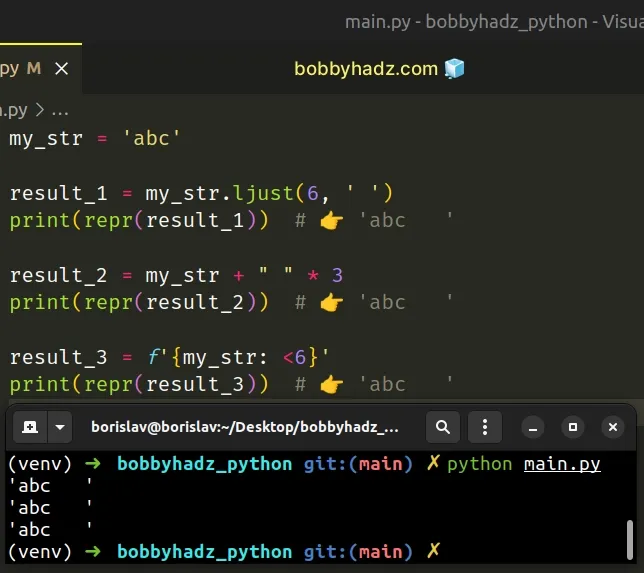
The first example in the code sample uses the str.ljust (left justify) method.
The str.ljust() method takes the following 2 arguments:
| Name | Description |
|---|---|
| width | The total length of the padded string |
| fillchar | The fill character to pad the string with |
ljust method pads the end of the string to the specified width with the provided fill character.# Adding spaces to the end of a string with the multiplication operator
An alternative solution is to use the multiplication operator to add a specific number of spaces to the end of the string.
my_str = 'abc' result = my_str + " " * 3 print(repr(result)) # 👉️ 'abc '
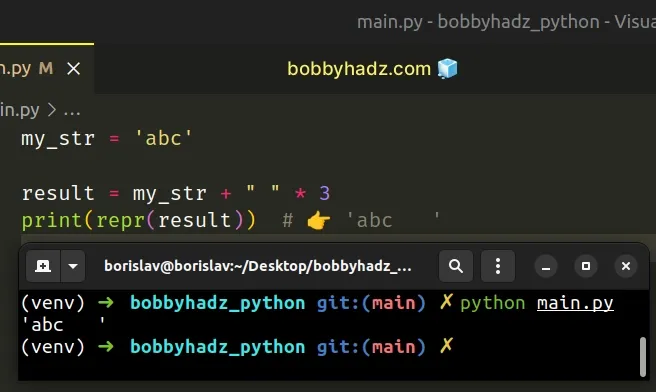
When a character is multiplied, it gets repeated the specified number of times.
print(repr(' ' * 3)) # 👉️ ' ' print('a' * 3) # 👉️ 'aaa'
# Adding spaces to the end of a string with a formatted string literal
You can also use the format string syntax to add spaces to the end of a string.
my_str = 'abc' result = f'{my_str: <6}' print(repr(result)) # 👉️ 'abc '
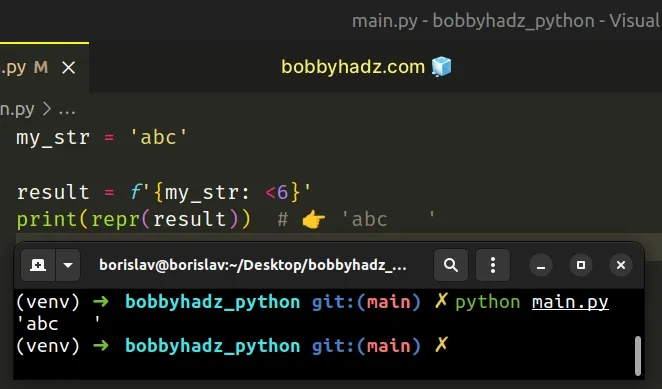
This is a bit harder to read, but we basically fill the string to a length of 6 characters aligning it to the left.
If you have the total length of the string stored in a variable, use curly braces.
my_str = 'abc' width = 6 result_3 = f'{my_str: <{width}}' print(repr(result_3)) # 👉️ 'abc '
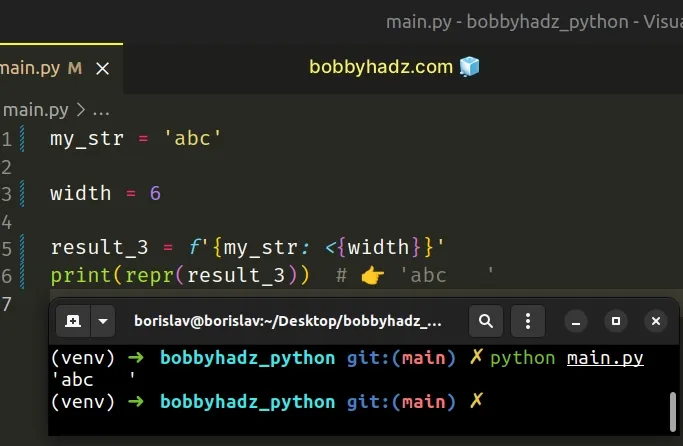
Formatted string literals
(f-strings) let us include expressions inside of a string by prefixing the
string with f.
my_str = 'is subscribed:' my_bool = True result = f'{my_str} {my_bool}' print(result) # 👉️ is subscribed: True
Make sure to wrap expressions in curly braces - {expression}.
# Table of Contents
- Add spaces to the beginning of a String in Python
- Add space between variables in Python
- Add spaces between the characters of a string in Python
# Add spaces to the beginning of a String in Python
Use the str.rjust() method to add spaces to the beginning of a string.
The rjust method takes the total width of the string and a fill character and
pads the beginning of the string to the specified width with the provided fill
character.
my_str = 'abc' result_1 = my_str.rjust(6, ' ') print(repr(result_1)) # 👉️ ' abc' result_2 = " " * 3 + my_str print(repr(result_2)) # 👉️ ' abc' result_3 = f'{my_str: >6}' print(repr(result_3)) # 👉️ ' abc'
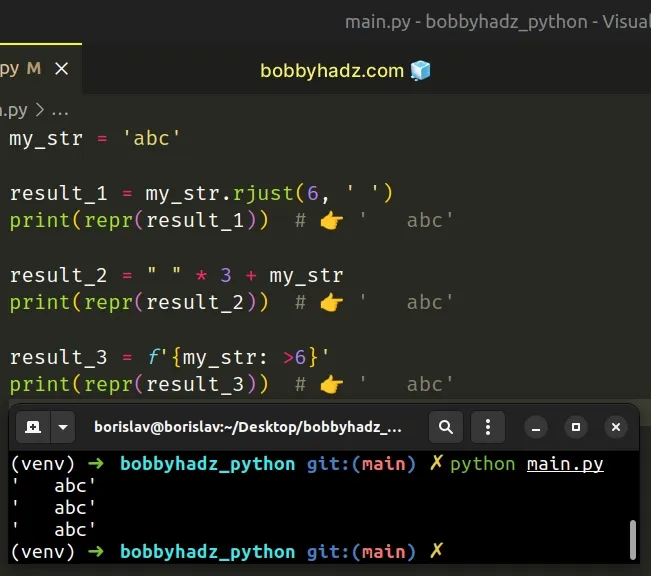
The first example in the code sample uses the str.rjust (right justify)
method.
The str.rjust() method takes the following 2 arguments:
| Name | Description |
|---|---|
| width | The total length of the padded string |
| fillchar | The fill character to pad the string with |
rjust method pads the beginning of the string to the specified width with the provided fill character.# Add spaces to the beginning of a String using the multiplication operator
An alternative solution is to use the multiplication operator to add a specific number of spaces to the beginning of the string.
my_str = 'abc' result_2 = " " * 3 + my_str print(repr(result_2)) # 👉️ ' abc'
When a character is multiplied, it gets repeated the specified number of times.
print(repr(' ' * 3)) # 👉️ ' ' print('b' * 3) # 👉️ 'bbb'
# Add spaces to the beginning of a String using an f-string
You can also use the format string syntax to add spaces to the beginning of a string.
my_str = 'abc' result_3 = f'{my_str: >6}' print(repr(result_3)) # 👉️ ' abc'
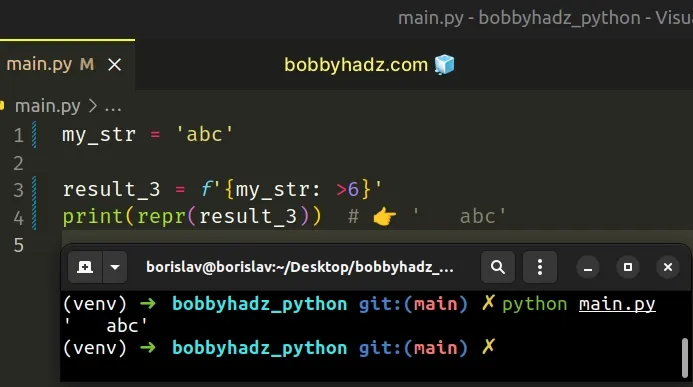
This is a bit harder to read, but we basically fill the string to a length of 6 characters aligning it to the right.
If you have the total length of the string stored in a variable, use curly braces.
width = 6 result_3 = f'{my_str: >{width}}' print(repr(result_3)) # 👉️ ' abc'
Formatted string literals (f-strings) let us include expressions inside of a
string by prefixing the string with f.
my_str = 'is subscribed:' my_bool = True result = f'{my_str} {my_bool}' print(result) # 👉️ is subscribed: True
Make sure to wrap expressions in curly braces - {expression}.
# Table of Contents
# Add space between variables in Python
You can also use a formatted string literal to add a space between variables.
var_1 = 'hello' var_2 = 123 result = f'{var_1} {var_2}' print(result) # 👉️ hello 123
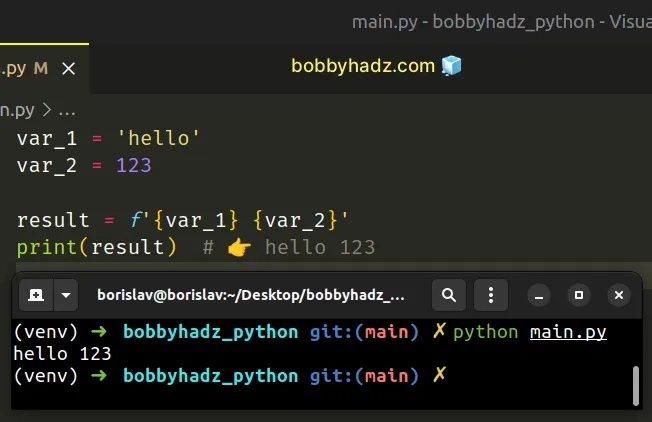
Formatted string literals (f-strings) let us include expressions inside of a
string by prefixing the string with f.
my_str = 'is subscribed:' my_bool = True result = f'{my_str} {my_bool}' print(result) # 👉️ is subscribed: True
Make sure to wrap expressions in curly braces - {expression}.
You can use this approach to add space between as many variables as necessary.
A formatted string literal can be used to add a space between two strings or two values of different types.
Alternatively, you can use the str.join() method to add space between
variables.
# Add space between variables using str.join()
This is a two-step process:
- Wrap the variables in a list.
- Use the
str.join()method to join the list with a space separator.
var_1 = 'hello' var_2 = 123 result_2 = ' '.join(map(str, [var_1, var_2])) print(result_2) # 👉️ hello 123
The str.join() method takes an iterable as an argument and returns a string which is the concatenation of the strings in the iterable.
TypeError if there are any non-string values in the iterable.If your list of variables contains numbers or other types, convert all of the
values to strings before calling join().
The map() function takes a function and an iterable as arguments and calls the function with each item of the iterable.
We used the map() function to convert the integer stored in var_2 to a
string but this isn't necessary if you are only joining strings.
var_1 = 'hello' var_2 = 'world' result_2 = ' '.join([var_1, var_2]) print(result_2) # 👉️ hello world
The code sample adds a space between the two strings.
# Add space between variables using str.format()
Alternatively, you can use the str.format() method.
var_1 = 'hello' var_2 = 123 result = '{} {}'.format(var_1, var_2) print(result) # 👉️ 'hello 123'
The str.format() method performs string formatting operations.
first = 'James' last = 'Doe' result = "His name is {} {}".format(first, last) print(result) # 👉️ "His name is James Doe"
The string the method is called on can contain replacement fields specified
using curly braces {}.
# Add space between variables using the addition (+) operator
You can also use the addition (+) operator to add a space between two variables, but make sure they are of compatible types.
var_1 = 'hello' var_2 = 123 result = var_1 + ' ' + str(var_2) print(result) # 👉️ 'hello 123'
str() class to convert the integer to a string so we can concatenate the variables with a space in between.When using the addition (+) operator, make sure the values on the left and right-hand sides are strings.
If you need to add multiple spaces between variables, use the multiplication operator to make your code more readable.
var_1 = 'hello' var_2 = 123 result = var_1 + ' ' * 3 + str(var_2) print(repr(result)) # 👉️ 'hello 123'
The multiplication operator can be used to repeat a string a specified number of times.
print(repr(' ' * 3)) # 👉️ ' ' print(repr('a' * 3)) # 👉️ 'aaa'
Formatted string literals take care of automatically converting the values to strings, so we don't have to explicitly use the str() class in the values are of different types.
# Add spaces between the characters of a string in Python
To add spaces between the characters of a string:
- Call the
join()method on a string containing a space. - Pass the string as an argument to the
joinmethod. - The method will return a string where the characters are separated by a space.
my_str = 'abcde' result = ' '.join(my_str) print(result) # 👉️ 'a b c d e'
The str.join() method takes an iterable as an argument and returns a string which is the concatenation of the strings in the iterable.
When called with a string argument, the join method adds the provided
separator between each of the characters.
my_str = 'abcde' result = '_'.join(my_str) print(result) # 👉️ 'a_b_c_d_e'
To insert spaces between the characters, call the join method on a string
containing a space.
my_str = 'abcde' result = ' '.join(my_str) print(result) # 👉️ 'a b c d e'
You can also add multiple spaces if you need to separate the characters by more
than 1 space.
my_str = 'abcde' result = ' '.join(my_str) print(result) # 👉️ 'a b c d e'
# Add spaces between the characters of a string using a for loop
An alternative approach is to iterate over the string and add spaces between the characters manually.
my_str = 'abcde' result = '' for char in my_str: result += char + ' ' * 1 result = result.strip() print(repr(result)) # 👉️ 'a b c d e'
Note that this approach is much more inefficient than using str.join().
You can multiply a string by a specific number to repeat the string N times.
print(repr(' ' * 3)) # 👉️ ' ' print(repr('a' * 3)) # 👉️ 'aaa'
If you need to remove the trailing spaces after the last character, use the
strip() method.
The str.strip() method returns a copy of the string with the leading and trailing whitespace removed.
The method does not change the original string, it returns a new string. Strings are immutable in Python.
# Additional Resources
You can learn more about the related topics by checking out the following tutorials:
- Remove special characters except Space from String in Python
- Replace multiple spaces with a single space in Python
- How to replace Spaces with Underscores in Python
- Split a String and remove the Whitespace in Python
- How to Split a string by Whitespace in Python
- Using json.dumps() without Spaces in Python
- Python: inconsistent use of tabs and spaces in indentation

